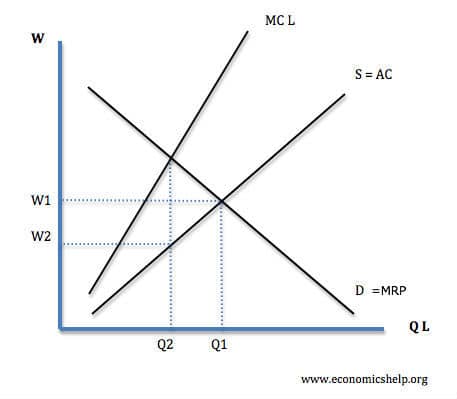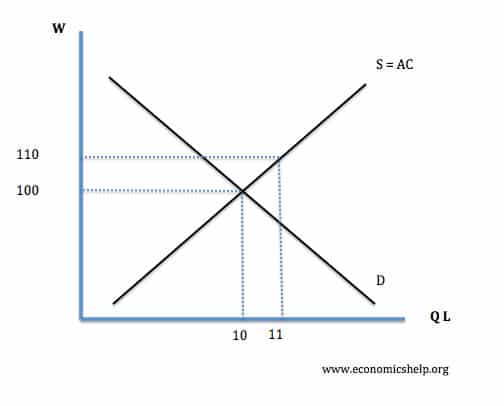“Readers Question – A microeconomics question. In you labour market section you discuss a monopsonist.You say that “in order to employ one extra worker the firm has to increase the wages of all workers”- why? You give a coal mine as a possible example of a monopsonist, do you really think that a coal mine owner hired an extra worker(the marginal cost) and then increased the “wages of all workers”? Can you clarify this.
Just think of an upwardly sloping supply curve of labour.
- If the firm offers a wage of £100, it can employ 10 workers.
- To employ 11 workers, it would have to increase the wage rate to £110.
Therefore, according to this supply curve, if the firm needs to employ 11 workers the firm has to pay every worker £110. Therefore the marginal cost of employing an 11th worker is £210 (11*110 = £1,210 – 10*100). The marginal cost of the 11th worker is greater than the average cost
Theory and in practice
1. Wage discrimination. One exception would be if a monopsonist could wage discriminate – i.e. pay £110 to the extra worker, but continue to pay £100 to the existing mine workers. In reality this could be possible. For example, the firm could introduce a special post or job title which pays £110, whilst the existing workers get stuck on £100. If the monopsony can get away with this, then it will not have to pay every worker £110.
2. Elastic supply. Also, another possibility is that the supply curve is very elastic, therefore there may be infinite (or at least a very large) supply of labour at £100. For example, in a period of high unemployment, there are probably many workers willing to supply there labour at £100. Many coal mine owners may find, even at low wages, a large pool of unemployed workers willing to take a job at £100.
However, the theory of an upward sloping supply curve suggests that the marginal cost of employing an extra worker will increase faster than average cost.
Readers Question: My confusion gets worse as on the same page you say that one of the problems with a monopsonist is it can “lead to lower wages for workers”. Doesn’t this contradict your above point about a monopsonists increasing all workers’ wages as it employs one extra worker?
The key thing is that a monopsonist is reluctant to hire extra workers, precisely because it would have to increase wages of all workers (high marginal cost). Because of this prospect the monopsonist prefers to employ less workers and pay lower wages. To profit maximise, it avoids the extra marginal cost of paying all workers more.

This diagram shows a theoretical monopsony. It’s profit maximising decision is to employ only Q2 workers at a wage of W2. (where MRP = MC). This is a lower wage and lower quantity of workers than in a perfectly competitive market.
See: Monopsony for more explanation
Is Tesco a monopsony?
Readers Question Or, is it all just theory? You talk of supermarkets behaving like monopsonists but I’m pretty sure my local Tescos doesn’t increase the wages of all its workers when it hires an extra worker.
I think it is true to some extent that Tesco will not increase the wages of all workers when hiring more workers. Though, in a period of full employment and labour shortages, it may have to increase wages, if it is short of staff.
Also, Tesco is not the best example of a monopsony. It may exhibit some monopsony behaviour – Workers have degrees of labour immobility e.t.c. But, Tesco workers could go and work at similar retail jobs elsewhere. A better example, is the government employing firemen. There is only one employer (government of firemen) If the government found there was a shortage of firemen, it may have to put up wages to attract more people into the profession.
Also, in the case of firemen, I don’t think the government could get away with paying just the new workers a higher wage.
Another way of thinking about it. Suppose Tesco cut wages by 20% (or freezed wages for several years), how many workers would leave and get a job elsewhere? Some would be able and willing to move, but many workers would feel tied to staying at Tesco.
I remember working for a tutorial college and the boss was a real profit maximising capitalist For three years he freezed nominal wages. I could have left and gone and worked somewhere else for a higher wage, but I felt it wasn’t worth the hassle. The diverse group of tutors at the college had little bargaining power. Therefore, I felt he had a degree of monopsony power – even if we could in theory work elsewhere
Related


Hi! I really like your website – it’s been a huge help throughout my micro class!
I have this problem on my microeconomics homework. Any chance you could help? I’m really stuck on 2c.
There is a selfie stick company called Narcissus that has conditional factor demands L(y) = y2 for labor and R(y) = y2 for raw materials. Labor gets paid wage w and raw materials cost r .
1 (a) Assume Narcissus is a price-taker, and the price of selfie sticks is $15. Write down the profit maximization problem of Narcissus and the first order condition for a profit max. Explain the economic intuition of the first order condition.
(b) Draw a graph of Narcissus’s marginal cost and demand and its optimal quantity. Explain in words the meaning of Narcissus’s marginal cost.
(c) Suppose that Narcissus only sells its product via Amazon. This gives Amazon monopsony power over Narcissus. Nevertheless, the selfie stick market in general remains perfectly competitive so even Amazon sells selfie sticks as a price taker with p = $15. Write Amazon’s profit maximization problem when buying from Narcissus. Find Amazon’s first order con- dition for a profit max.
(d) Draw a new graph of Narcissus’s marginal cost and show Amazon’s marginal cost of buying selfie sticks from Narcissus and Amazon’s optimal quantity to buy and price to pay. Note that Amazon’s marginal cost is different from Narcissus’s marginal cost due to the monopsony. Explain in words the meaning of Amazon’s marginal cost.